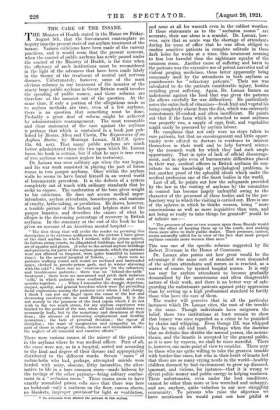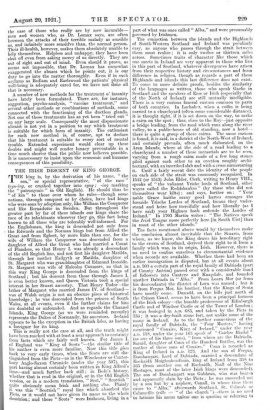THE CARE OF THE INSANE. T HE Minister of Health stated
in the House on Friday, August 5th, that the Government contemplate an inquiry into the present state of our asylum treatment of the insane. Various criticisms have been made of the current practices, and it would seem that the present moment, when the control of public asylums has newly passed under the control of the Ministry of Health, is the time when the efficiency of such institutions must be reconsidered in the light of the advances that have been made lately in the theory of the treatment of mental and nervous diseases. Unfortunately, however, some of the most obvious reforms in our treatment of the inmates of the ninety large public asylums in Great Britain would involve the spending of public money, and these reforms are therefore at the moment out of the question. At the same time, if only a portion of the allegations made as to asylum methods are true, even of a few asylums, there is no question that something must be done. Probably a great deal of reform . might be achieved by administrative rearrangement. The most reasonable and clear statement of the case against the asylums is perhaps that which is contained in a book just pub- lished by Messrs. Allen and Unwin, The Experiences of an Asylum Doctor, by Montagu Lomax, M.R.C.S. (price 12s. 6d. net). That many public asylums are much better administered than the two upon which Dr. Lomax bases his book is certain, but if what he says is true even of two asylums we cannot neglect his testimony. Dr. Lomax was over military age when the war began, and his war work consisted in playing the part of locum tenens in two pauper asylums. Once within the asylum walls he seems to have found himself in an unreal world of bureaucratic precedent. It is the defects of a system completely out of touch with ordinary standards that he seeks to expose. The moderation of his tone gives weight to his criticisms. He does not accuse medical super- intendents, asylum attendants, housekeepers, and matrons of cruelty, bribe-taking, or peculation. He draws, however, a terrible picture of the forlorn and helpless state of the pauper lunatics, and describes the causes of what he alleges is the decreasing percentage of recovery in British asylums. In the summary at the end of the book he has given an account of an American mental hospital :- " The first thing that will strike the reader on perusing this description is its extreme unlikeness to the picture I have given of the chief asylum in which I worked, with its prison aspect, its forlorn airing-courts, its dilapidated buildings, and its general air of squalor and gloom. (I refer to the actual asylum buildings and precincts, for parts of the asylum grounds, which the patients were not allowed to frequent, were quite beautiful in summer time.) In the mental hospital of Toledo, . . . there were no patients walking round and round an enclosed and barricaded space, clothed in pseudo-prison garb, and in winter shivering with the cold • ; there was no exercise-pen ' for the refractory and troublesome patients ; there was no behind-the-table ' treatment ; there wore no unwarmed and pitch dark isolation cells,' in which patients were confined for weeks and oven months together.. . . When I remember the despair, dejection, disgust, apathy, and general boredom which were the prevailing facial expressions among the patients over whom I had charge, I think I can put my finger upon the cause of the low and decreasing recovery-rate in most British asylums. It is duo not merely to the poorness of the food (upon which I do not wish to lay too much stress, for my asylum experience was limited to the period of the war, when all food conditions were necessarily bad), • but to the monotony and dreariness of their lives ; the absence of interesting employment and healthy recreation ; the lack of personal freedom ; the rigour of discipline ; the want of imagination and sympathy on the part of those in charge of them, doctors and attendants alike ; the neglect of all remedial and curative efforts."
There were various causes of the misery of the patients in the asylums where he was medical officer. First of all, the cases were not, as in a hospital, sorted out according to the kind and degree of their disease and appropriately distributed to the different wards. Severe " cases " of melancholia who had, perhaps, attempted suicide were herded with noisy, obscene, filthy incurables, the alter- native to life in a bare common room—made hideous by the ravings of the other patients—being solitary confine- ment in a " seclusion room." These rooms seem to have exactly resembled prison cells save that there was here no bedstead—only a mattress on the floor, canvas sheets, no blankets, improper provision "for light or ventilation, • No overcoats were allowed the patients In this asylum. and none at all for warmth even in the coldest weather. If these statements as to the " seclusion rooms " are accurate, their use alone is a scandal. Dr. Lomax, how- ever, says that so acute was the shortage of attendants during his term of office that he was often obliged to confine sensitive patients in complete solitude in these. dark holes for weeks at a time, this treatment seeming to him less harmful than the nightmare squalor of the common room. Another cause of suffering and harm to the patients was the excessive use of potent narcotics and of violent purging medicines, these latter apparently being commonly used by the attendants in both asylums as punishments for " refractory patients." Their use was calculated to do the patients considerable injury, besides entailing great suffering. Again, Dr. Lomax frames an indictment against the food that was given the patients (he allows carefully for war difficulties). He particularly notes the entire lack of vitamines—fresh fruit and vegetal les being completely absent from the diet, which was extremely monotonous, ill-cooked, and often insufficient. He points out that if the farm which is attached to most asylums was properly run, a supply of eggs, fruit, and vegetables might easily be procured by asylum labour. He complains that not only were no steps taken to cure patients, but that no encouragement and little oppor- tunity were offered to doctors in residence to interest themselves in their work and to help forward science by the research work for which they had such ample opportunity. That in spite of lack of official discourage- ment, and in spite even of bureaucratic difficulties placed in their way, medical officers in British asylums do con- tribute to our knowledge of psychological problems, is but another proof of the splendid ideals which make the medical profession one of the finest bodies in the world.
Last of all, he points out how the safeguards provided by the law in the visiting of asylums by the committee in control has become largely unfruitful owing to the character of the personnel of these bodies and to the per- functory way in which the visiting is carried out. Here is one of the spheres in which he thinks women, being " more conscientious as well as more inquisitive than men, and not being so ready to take things for granteds" :would be of infinite use :- " The presence of one or two women upon these Boards would have the effect of keeping them up to the mark, and making them more alive to their public duties. Their presence, indeed, seems naturally called for in view of the fact that most pauper asylums contain more women than men."
This was one of the specific reforms suggested by Sir Robert Newman in the House of Commons.
Dr. Lomax also points out how great would be the advantage if the same sort of standard were demanded of the asylum attendants and nurses as is reached, as a matter of course, by trained hospital nurses. It is only too easy for asylum attendants to become gradually demoralized by the monotonous and often disagreeable nature of their work, and there is no better way of safe- guarding the unfortunate patients against petty oppression than by setting up a high professional standard to fortify those who have the care of them.
The reader will perceive that in all the particular instances which Dr. Lomax cites, the root of the trouble is the same. Though individuals have outgrown the belief, these two institutions at least remain to show that lunacy was once regarded as a crime to be punished by chains and whipping. Even George III. was whipped when he was old and mad. Perhaps when the doctrine that no definite line divides the normal person, the neuras- thenic, and the lunatic is accepted by the general public, as it is now by experts, we shall be more merciful. There is, however, one more point of view to consider. There may be those who are quite willing to take the greatest trouble with border-line cases, but who in their heart of hearts feel that there are so many crying needs in the world—healthy children doomed by bad environment to grow up diseased, ignorant, and vicious, for instance—that it is wrong to divert public money and public energy to helping madmen. These unfortunates, even under the best conditions, cannot be other than more or less wretched and unhappy, and are, anyhow, quite valueless to our now struggling community. To persons who raise the objection we have mentioned we would point out how pitiful is the case of those who really are by now incurable— men and women who, as Dr. Lomax says, are often between the attacks of their terrible malady as sensible as, and infinitely more sensitive than, the normal person. Their ill-health, however, makes them absolutely unable to help themselves. Helpless and unhappy, they have been shut off even from asking mercy of us directly. They are out of sight and out of mind. Even should it prove, as seems not impossible, that Dr. Lomax has somewhat exaggerated the abuses which he points out, it is our duty to go into the matter thoroughly. Even if in such asylums as Bedlam and Earlswood the patients' physical well-being is adequately cared for, we have not done all that is necessary.
A number of new methods for the treatment o! insanity have lately been formulated. There are, for instance, suggestion, psycho-analysis, " vaccine treatment," and several other methods or combinations of methods, some connected with the functioning of the ductless glands. Not one of these treatments has as yet been " tried out " on any large scale. Consequently the most dispassionate alienist is not yet in a position to say which treatment is suitable for which form of insanity. The enthusiast for each new method is, of course, apt to declare that his treatment is suitable to every sort of mental trouble. Extended experiment would clear up these doubts and might well render lunacy preventable in a time much shorter than the public now believes possible. It is unnecessary to insist upon the economic and humane consequences of this possibility.



































 Previous page
Previous page